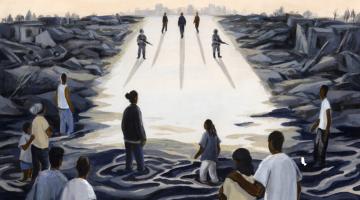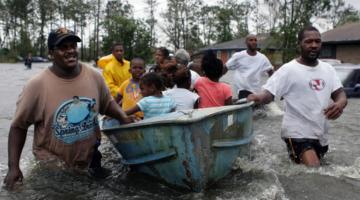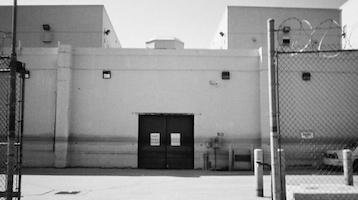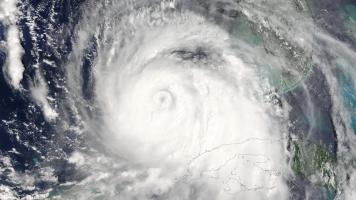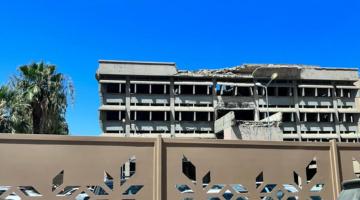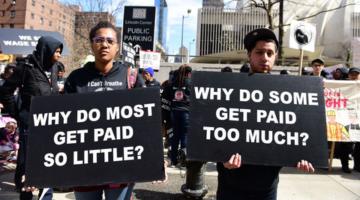New Orleans residents walk through chest deep floodwater during Hurricane Katrina Monday, Aug. 29, 2005 (Courtesy of ABC)
Originally published in Scalawag Magazine
Survivors open up about struggles with lingering post-traumatic stress disorder 18 years after the storm
When Hurricane Katrina touched down in New Orleans in late August 2005, nine-year-old Nia Burnett was too young to realize that her life would never be the same.
Nia's family had chosen to stay in the city and wait out the storm. They all headed to a local hospital for safety. What they found were corpses lining the hallways. The whole building smelled like rotten flesh. Nia remembers later standing on the roof after the hospital started flooding, waiting to be rescued. Below her, she watched as all the neighborhoods she used to play in with her friends were swallowed up by the rising waters. Meanwhile, even more bodies floated around the hospital. It wasn't until 11 years after the storm that Nia was diagnosed with post-traumatic stress disorder.
The Category 5 hurricane reached wind speeds of 175 mph and killed nearly 2,000 people, with predominantly Black parts of the city being hit the hardest. In total, Hurricane Katrina caused $108 billion in damages. Some parts of New Orleans still haven't fully recovered from Katrina 18 years later—and they may never.
"Race and class played a lot in the lack of response, in the lack of financial support that we're still struggling to get in the city of New Orleans," former New Orleans mayor Ray Nagin told BBC News in 2010. "If this had been a much more affluent place, a place that was not as populated by African Americans, I am firmly convinced that it would have been a different kind of response," he said. Sadly, many Black people from low-income areas could not afford to leave and were left to fend for themselves. FEMA's delayed response to Hurricane Katrina, which took place in a city that was 67 percent Black at the time, was a blatant instance of environmental racism.
Years later, Katrina survivors continue to battle trauma
Nia, who is originally from New Orleans East, waited out the storm with her mom, uncle, and two siblings. They went to Methodist Hospital because her mom was a nurse there.
"We ended up getting trapped in [the] hospital. We got hit with a lot of flooding, and we couldn't get out. Some of the floors were inundated with water," she says. "I remember a line of white body bags. They kept us, the living, away from the dead. They lined the hallway with the bodies."
Nia is one of many Black people with post-traumatic stress disorder as a direct result of surviving Hurricane Katrina. Damaris Calliet, who was 22 years old during Katrina, believes she also has post-traumatic stress disorder due to her experiences during and after the storm.
"I know I have PTSD. I've never been diagnosed because I've been diagnosed with so many things. I am always in survival mode and don't know how to escape it," she says.
On the morning of August 29, 2005, Damaris and her sister sat in 18 hours of traffic to get to Houston. Three weeks later, after Katrina had come and gone, they went back to New Orleans to return to their apartment.
Physical and mental effects of environmental exposure linger far after the storm
As Damaris assessed the hurricane's damage to her apartment, she recounted seeing mold and a tree that had fallen through the front window. She and her sister had to clean it themselves because the owners threatened to put the apartment on their credit. Damaris, her sister, and her best friend rented a new apartment in Houston, where she stayed for nine months. Then, she moved back to New Orleans and lived in a FEMA trailer. She has been dealing with health problems ever since.
Some survivors who lived in FEMA trailers were exposed to formaldehyde, a substance used to embalm bodies. Prolonged formaldehyde exposure can cause several types of cancer. This was the case for Damaris.
"The type of cancer I have (pancreatic) doesn't go into remission. I don't have any active cancer cells, but that doesn't mean it can't go to another spot or can't come back in the pancreas." On June 15, 2009, Damaris went into surgery. The procedure lasted four hours, and she lost half of her pancreas. "I had to get my whole life back together. I was a full-time student, full-time mom, and full-time cancer patient," she says. "I was in the hospital four days a week."
Damaris isn't alone, as 11,000 survivors reported to FEMA that they experienced health problems, from nosebleeds to asthma, after living in one of their trailers. She says the government never acknowledged knowingly putting people in trailers with unlivable conditions.
When the hurricane first touched down in the city, Miesha Williams was 12 years old. She is originally from the Lower Ninth Ward, one of the areas hit hardest by the storm.
On the morning the storm started, Miesha, her mom, brothers, grandmother, and uncle took boats to a bridge and eventually made their way to the convention center. "We had to walk in the water for a little bit," she says.
When they arrived at the convention center, a rancid smell lingered in the air as hundreds of people waited to be rescued. Miesha recounts the toilets overflowing with feces and having to go to the bathroom outside, not in the restroom. After several days, buses arrived to take them to Houston.
Miesha also believes that she has post-traumatic stress disorder, though she hasn't been able to get an official diagnosis. Now, the 30-year-old is a photographer and still gets nervous around this time of year. "It's hurricane season. I didn't take clients at this time to be extra prepared if we have to leave," she says.
According to Dr. Sarah Lowe, an associate professor of social and behavioral sciences at the Yale School of Public Health who has been studying Hurricane Katrina since 2006, post-traumatic stress disorder is common in survivors.
"We found that the rates [of PTSD] were elevated compared to that of the general population. Around 16 percent of our participants probably have post-traumatic stress disorder related to the hurricane," she says.
She has developed a deeper sense of empathy from working with Katrina survivors.
"Having to go back to a house that is destroyed, navigating insurance, being separated from people. It has an initial impact with a long tail that enhances vulnerability to PTSD."
But although many survivors have mental health issues, they seem to remain hopeful.
"We can bounce back through anything. I feel like even with Katrina, we were really [there] for each other after that," Miesha says. "We are still trying to move on, to move forward. We have to move forward."
Maya Richard-Craven is a Black and neurodivergent journalist from Los Angeles. As someone with an intersectional identity, she feels qualified to discuss race, neurodivergence, ableism, gender, and more. Her work has appeared in over 30 publications including The Los Angeles Times, The Boston Globe, The Guardian, USA TODAY, and more.




